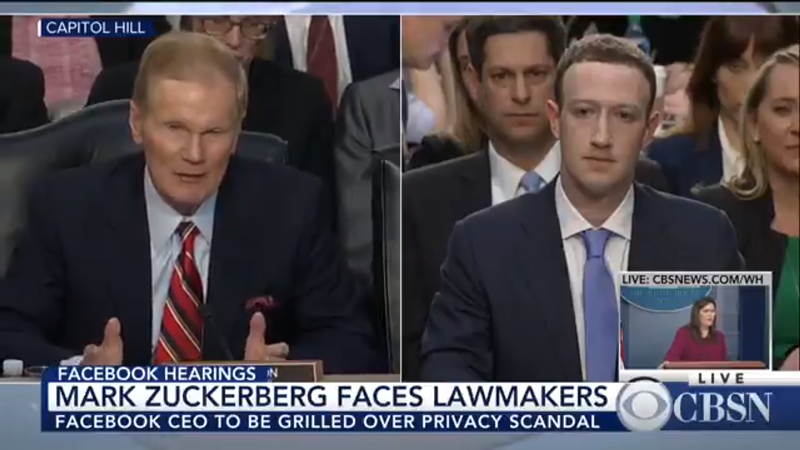"Let me just cut to the chase. If you and other social media companies do not get your act in order, none of us are going to have any privacy anymore. That is what we are facing," says Sen. Bill Nelson, D-Florida https://t.co/CbFO899XlU pic.twitter.com/IytyrHjqY5
— CBS News (@CBSNews) April 10, 2018
As the world watched U.S. senators this afternoon grill Facebook founder Mark Zuckerberg about how his company handles all the personal data it vacuums up, Sen.
"Let me just cut to the chase," said Nelson, who is running a heated reelection campaign against GOP governor and dead-eyed shark Rick Scott. "If you and other social media companies do not get your act in order, none of us are going to have any privacy anymore. That is what we are facing."
Zuck is sitting through hearings in D.C. after Facebook admitted personal data from 87 million Americans incorrectly fell into the hands of Cambridge Analytica, an American-British campaign-propaganda contractor. It's absolutely true that Facebook's data-collection processes should be heavily scrutinized and regulated, and Nelson's statement does hold basic truth at its core.
But it's curious to hear that Nelson cares so much about the future of internet privacy, because he has been a massive cheerleader for the warrantless spying programs of the National Security Agency (NSA) over the years despite the repeated protests of the American Civil Liberties Union (ACLU), the Electronic Frontier Foundation (EFF), and other civil rights groups.
In short, Section 702 of the Foreign Intelligence Surveillance Court (FISA) Amendment Act basically lets the U.S. government collect data on any calls,
The ACLU and EFF want the program either vaporized or amended to ensure the U.S. government obtains warrants before it spies on anyone. According to the ACLU, the FISA court has even admitted in the past that NSA surveillance might have violated basic Fourth Amendment rights.
Despite these concerns, Nelson has consistently supported the program. In 2014, he was the only Senate Democrat to vote against curtailing NSA spying. In 2015, he argued Section 702 should be "extended permanently" because he believes the program is necessary to fight "terrorism" at home and abroad despite the fact that the public has basically zero
In January, Nelson went a step further. Section 702 needs to be reauthorized every few years, but after repeatedly campaigning against Donald Trump and basically calling him an existential threat to American democracy, Nelson voted in favor of extending the NSA's spying programs through the rest of Trump's term. Nelson's vote helped hand the president the keys to the most powerful state-sponsored spying network in world history.
Speaking to CNN yesterday, Nelson made the same claims about the alleged "future of privacy." He told CNN's WolfCongress abdicated its responsibility to ensure that our intelligence agencies respect the Fourth Amendment. Instead of instituting needed reforms, lawmakers voted to give the Trump administration broad powers to spy on Americans and foreigners without a warrant.
— ACLU (@ACLU) January 18, 2018
People all over the world should worry about malicious state actors getting their hands on private internet data. But it's telling that Nelson does not seem to have the same concerns about U.S-led spying networks, which have admitted to spying on American dissidents and activists in the past. In just one example, the Intercept reported in 2014 that the NSA had spied on at least five politically active American citizens.Sen. Bill Nelson: If we don’t act on Facebook, “none of us are going to have any privacy anymore” https://t.co/j2vKcfuFuo
— CNN Politics (@CNNPolitics) April 9, 2018
Yes, absolutely, there are problems with Facebook's data-retention policies, in that the company is basically a monopoly lording over the intimate personal details of millions of Americans without any real government oversight. Nelson was right to lob criticism at Zuckerberg.
But if the senator is serious about protecting the future of internet privacy, as he claimed in his semiviral quote today, he could also take care to look at some of his own decisions.













